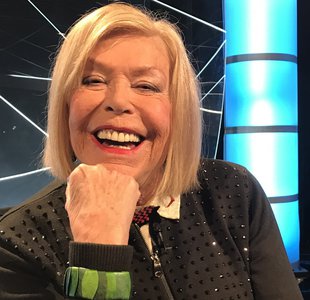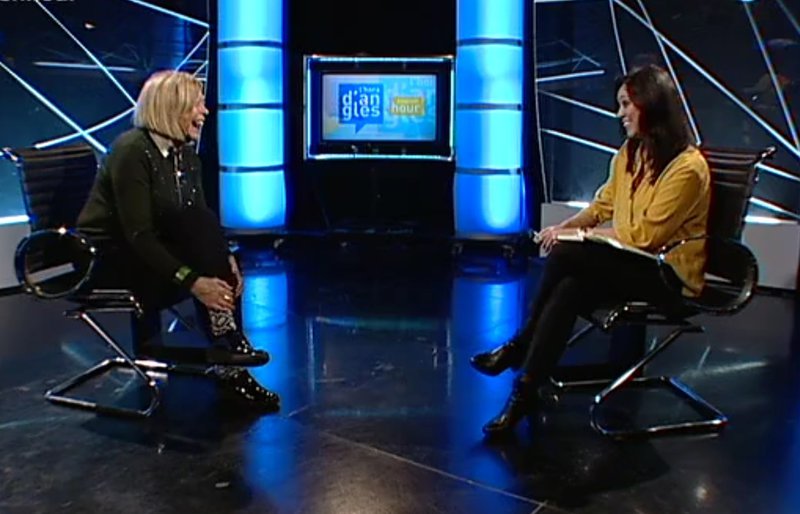Interview
'The girl off the telly'

You need no introduction, you were a symbol of the Gauche Divine period and one of the most popular actresses in the 1960s.
I have been very lucky, but my career was all a coincidence. I got married at 20 to escape from family, a coincidence with many women of my age; we all married very young, just to be free. It was very difficult in those times for a woman to be free. In the 1960s I started modelling by chance. My husband was working at the Seix i Barral publishing house, and a friend photographer was there and took a photo of me, and automatically, I started doing thousands of photos for commercials. In a few years, I became more popular on TV than Franco himself, I was the chica de la tele. I had three little boys at the time and they didn't feel very comfortable with people stopping and recognising me on the street. I was so popular that cinema directors started to offer me parts in films. My first film was Vicente Aranda's Fata Morgana.
How did you find adapting to the cinema?
Terrible, I had a complex about it, because my previous experience was selling a product. The first week of shooting, I remember we were in plaça Sant Jaume with lots of people around, and I felt so insecure and uncomfortable, I asked how much it would cost me to leave the film, because I felt I couldn't do it. But I couldn't afford it, so I stayed.
You've done 155 films so far, that's something.
Yes, because of my physical attributes I had a lot of offers. Sometimes my intellectual friends asked me why I was accepting them, and I would answer: “If I don't do these films, will you pay me every month?” And now when I see some of these films, I realise it was the history of Spain, especially the conflicts between genders, how men treated women in those times.
But a time comes when you decide to stop.
The last film had too many explicit scenes. The director told me he would cut them but he didn't, and that was the last straw. So I went to Begur to set up a restaurant with my second husband, Craig Hill. I had never cooked in my life but I bought a book by Paul Bocusse; I would spend a day to making one dish, but it was a big success. I spent five years there. It was a great time.
But you didn't give up film completely. Actually, you have just done your first comedy with Ventura Pons.
One day for lunch I told him, we've known each other for so many years, but never worked together, I wanted to do a comedy, and he offered me this comedy as a present, Oh, quina joia!, I have a sense of humour, but they never saw me like that, and that brought in other projects.
Actually you play yourself, it's like your own biography.
We had a lot of fun, Ventura shoots very fast and I had a long script to learn and I had a really good connection with the main actor, my nephew in the film.
After that, you shot a short film with Manel Ciurana.
He is a genius, the script and music were very good, and I play a posh lady living and working in a spa, that's why it's called the Lady of 2012.
Then you released Los del Túnel, in Madrid.
My part is very small but very challenging, very long hours of filming in the dark and cold, but a great experience. Everyone gets stuck in a tunnel after an accident, and the interesting part is what happens inside and the relations between the people.
What's your relationship with English?
Thanks to my husband Craig. We met in 1965 in Italy while shooting a film, and I had my prejudices about American actors, but he was just the opposite, kind and respectful. I always say: falling in love with a beautiful woman is easy, but falling in love with a woman with three sons not just any man would accept that. I learnt English mostly by ear. I remember the first time I went to California I cried because I found it so difficult.
What about projects?
If something appeals, I do it, but I've worked a lot already. I'm tired of this protocol of image. In normal life I don't use any make up, only lipstick and sunglasses, although people still recognise me. But you never know, my life is constantly changing. They offer me parts of old ladies, but even with make up I don't give that image, and I'm 80!
What's your secret?
There is none! People have no idea what I'm really like. I like cooking, doing the housework, doing petit point, I am very homey, nothing to do with sophistication and glamour. I have four grandsons and four great grandsons. I have lots of projects but not enough time, like writing a book, but not memoirs, because I am very honest and I now somebody would be hurt, and I don't want that.
Which is the film you are most proud of?
I feel so lucky for being in El espiritu de la Colmena, one of the best films ever and one everyone should see before dying.
Leave a comment
Sign in.
Sign in if you are already a verified reader.
I want to become verified reader.
To leave comments on the website you must be a verified reader.
Note: To leave comments on the website you must be a verified reader and accept the conditions of use.




